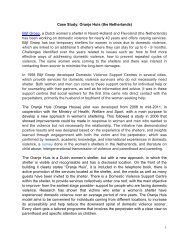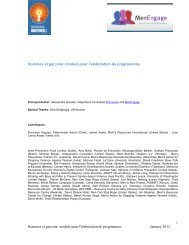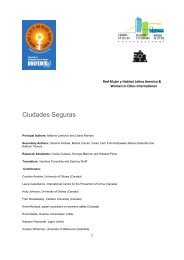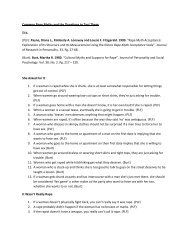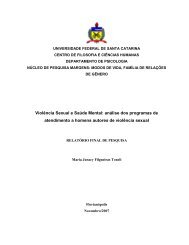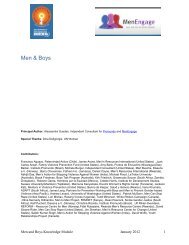Campaigns to End Violence against Women and Girls - Virtual ...
Campaigns to End Violence against Women and Girls - Virtual ...
Campaigns to End Violence against Women and Girls - Virtual ...
Create successful ePaper yourself
Turn your PDF publications into a flip-book with our unique Google optimized e-Paper software.
three sets of questions: (1) Is the radio station working effectively internally <strong>and</strong> do the<br />
volunteers have contracts, rights <strong>and</strong> clearly defined duties?<br />
(2) Do the programmes respond <strong>to</strong> the interests of the public? Are they well researched,<br />
using culturally relevant formats such as s<strong>to</strong>ry telling, songs, proverbs <strong>and</strong> music? Are<br />
they considered good <strong>and</strong> effective by listeners? (3) Does the radio station create<br />
desired development <strong>and</strong> social change (determined by the original baseline research)<br />
within the community?<br />
Source: (abstract) Jallov, B., 2005. Assessing community change: development of a<br />
‘bare foot’ impact assessment methodology, UNESCO/UNDP Mozambique Media<br />
Development Project.<br />
Moni<strong>to</strong>ring by cellphone: WE CAN in Tanzania<br />
In Tanzania, the Tunaweza (“We Can”) campaign alliance uses mobile telephony <strong>to</strong><br />
moni<strong>to</strong>r outcomes. Tunaweza encourages individuals – women <strong>and</strong> men, girls <strong>and</strong> boys<br />
– across society <strong>to</strong> pledge <strong>to</strong> eliminate VAW in their own lives, <strong>and</strong> <strong>to</strong> promote nonviolence<br />
within their social circles. Mobile telephony is wide-spread in Tanzania, so<br />
Tunaweza alliance members gather the mobile telephone numbers of these “change<br />
makers” at the moment when they take their pledge, <strong>and</strong> then call up a sample of<br />
“change makers” at regular intervals <strong>to</strong> find out about “change maker” activities <strong>and</strong> their<br />
effects. These are recorded in writing, shared in campaign team meetings <strong>and</strong> used as<br />
case studies when reporting <strong>to</strong> the media <strong>and</strong> <strong>to</strong> donors. The Tunaweza alliance’s “flat<br />
rate” mobile telephony subscriptions with all major providers makes the process easy<br />
<strong>and</strong> resource efficient.<br />
MEETINGS FOR MONITORING<br />
Meetings are not only an internal communication <strong>to</strong>ol, but also key opportunities <strong>to</strong><br />
gather <strong>and</strong> analyze information for moni<strong>to</strong>ring purposes. In turn, moni<strong>to</strong>ring results need<br />
<strong>to</strong> be fed in<strong>to</strong> management meetings so that decisions are based on robust evidence.<br />
� Briefings, e.g. team <strong>and</strong> activist meetings before campaign events <strong>to</strong> plan for the<br />
activity, <strong>and</strong> debriefings shortly after the activity takes place, should be recorded in<br />
writing. A one-page form recording only the key information is mostly sufficient.<br />
� Regular team meetings are meetings at short intervals (e.g. weekly) with lead<br />
members of the campaign team, or specific task forces or activists’ groups, <strong>to</strong> review<br />
recent campaign actions, outcomes <strong>and</strong> any key changes in the context. Team<br />
meetings should be action-oriented <strong>and</strong> conclude with agreements on action,<br />
recorded as “action points”. At each meeting, “action points” from previous meetings<br />
can be reviewed <strong>to</strong> verify progress.<br />
� Quarterly Reviews usually review progress <strong>to</strong>wards objectives every three months.<br />
In addition <strong>to</strong> key issues raised at team meetings, they may contain an evaluative<br />
element – i.e. <strong>to</strong> assess whether the activities over the past quarter were effective<br />
<strong>and</strong> efficient.<br />
Practical tips for quarterly reviews:<br />
Ask lead members of the campaign team <strong>and</strong> its task forces <strong>to</strong> present short overviews<br />
of the key activities, successes <strong>and</strong> challenges over three months. Report sheets of<br />
regular team meetings can be a basis for this report.<br />
Review key outcomes, including unintended outcomes – positive <strong>and</strong> negative ones.<br />
279<br />
<strong>Campaigns</strong> December 2011



